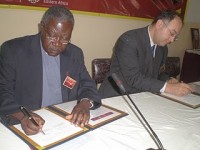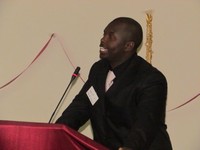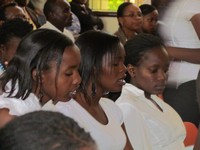Diary of trip to Kenya, 3rd part, 29 gennaio 2011
By Luigino Bruni
 The main event of the convention’s last day was the signing of the “agreement” between the Economy of Communion and Catholic University (CUEA) to develop the EoC together in the next few years. It was a solemn, strong, symbolic moment, full of meaning. The previous day, the Nuncio had celebrated liturgy with the whole university, and even if I don’t know what the liturgies of the first Christians at Antioch were like, neither those of Francis of Assisi, and I have never seen a liturgy in the Andes or in Australia, it’s truly hard to imagine that there can be any masses more beautiful than the ones I’ve seen here.
The main event of the convention’s last day was the signing of the “agreement” between the Economy of Communion and Catholic University (CUEA) to develop the EoC together in the next few years. It was a solemn, strong, symbolic moment, full of meaning. The previous day, the Nuncio had celebrated liturgy with the whole university, and even if I don’t know what the liturgies of the first Christians at Antioch were like, neither those of Francis of Assisi, and I have never seen a liturgy in the Andes or in Australia, it’s truly hard to imagine that there can be any masses more beautiful than the ones I’ve seen here.
The beginning dances by the young people to open the official liturgy and the songs in traditional languages would already be enough to make these liturgies truly splendid. Then, I found the same solemnity of those masses in the moment when this pact was signed by Vice-chancellor Prof. Marviiri and I. The signing was something serious, committing, a pact or covenant (like that mentioned in Genesis), which commits us even more to Africa in the next few years. The commitment we took together is to promise two courses (three weeks each) on the EoC – one open to everyone and the other to masters students, starting this July. The idea is to develop this  collaboration always more, also involving Sophia University Institute (Vice-chancellor Fr. John C. Maviiri attended the inauguration of Sophia).
collaboration always more, also involving Sophia University Institute (Vice-chancellor Fr. John C. Maviiri attended the inauguration of Sophia).
In my brief official message, I said three things:
1. We did not come to Africa to offer recipes but because we were attracted by the life that was already here, especially by the life of our communities that have been in Africa for more than 50 years and are, by now, in all the countries there. We came as an answer of love out of great love for Africa, which touches all those who have come to these brown lands throughout the centuries (even out of an implicit or explicit desire to repair many sufferings provoked by the West).
2. I still don’t know if the EoC will be useful to Africa. What I am sure about is that Africa was very important for the EoC, because it allowed us to understand the potential and the characteristics of Chiara Lubich’s intuition.
3. “No EoC without Africa” – this was my concluding remark, inviting everyone to the upcoming events next May in Brazil, for the 20 years of the project, in order to make Africa’s presence in the worldwide EoC network even more visible today.
What has come out of this trip? A few things have been strongly outlined.First of all, it has emphasized that the main way that the EoC proposes to relieve extreme poverty is not primarily through the redistribution of wealth (taking from the rich and giving to the poor) but in the creation of new wealth – in the process, this new wealth also goes for those in economic trouble. The number of pies must be increased rather than just cutting the “pieces” of the same pie in different ways.
Secondly, the EoC shows itself always more as an economic vision open to all men and women of good will, especially now that it’s present in the Encyclical.
 Then, in this context what stood out strongly was to understand once again that, in order for the EoC to work, it needs a direct relationship with poverty. When Chiara Lubich launched the project, touched by the crown of thorns – by the poverty of Sao Paulo and of Brazil – she called the Brazilian community mainly to do something more to resolve that scandal. So Brazil took off, poor but many, building the business park, the 100 businesses…because the EoC was linked (today, perhaps less directly even in Brazil) to an evident and direct problem of poverty. If this direct contact is missing, the EoC businesses don’t understand the meaning of what they do. Besides, it is no longer enough to gather money in Europe to use it in other parts of the world within our movement, because that link is too weak, at least as the years go by.
Then, in this context what stood out strongly was to understand once again that, in order for the EoC to work, it needs a direct relationship with poverty. When Chiara Lubich launched the project, touched by the crown of thorns – by the poverty of Sao Paulo and of Brazil – she called the Brazilian community mainly to do something more to resolve that scandal. So Brazil took off, poor but many, building the business park, the 100 businesses…because the EoC was linked (today, perhaps less directly even in Brazil) to an evident and direct problem of poverty. If this direct contact is missing, the EoC businesses don’t understand the meaning of what they do. Besides, it is no longer enough to gather money in Europe to use it in other parts of the world within our movement, because that link is too weak, at least as the years go by.
What can we do then? On one hand, we need to increase the attention given to the link between the activities of all the business and some projects (the bigger, more committed ones) that the EoC as a whole brings ahead in the world. After 20 years, micro-projects are not enough to keep the entrepreneurs impassioned to give a good part of their profits: we need to do more. Besides – and according to me, an even more decisive factor – we need to relaunch among the EoC entrepreneurs throughout the world a new season of creativity in the way they discover the various kinds of poverty in their cities (and not only material poverty) and in doing something directly for the poor, perhaps together with them.
The EoC arose because a world where there are people in need on one hand and opulence on the other cannot be “a united world” (Chiara Lubich’s charism of unity). Therefore, the EoC will always pay special attention and care to the various forms of poverty (and to the wealth that is not shared, another form of “misery”), and not only just in some countries of the world.






